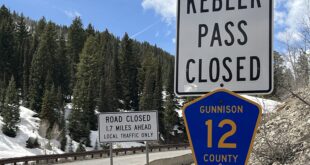Waiting to set new policies around STRs until questions are resolved
[ By Katherine Nettles ]
Despite what appeared to be a large voter turnout and wide margin of voter approval for a series of new covenant changes within the Crested Butte South Property Owners Association (POA) this fall, several property owners have raised concerns about how the October election was conducted. As the POA plans ahead for its 2022 budget and how to handle policies to support the recently passed covenant changes in the new year, the board of directors has put some policymaking aspects on hold to conduct a ballot recount and to address a request for a review of the records related to the election.
During the monthly POA board of directors meeting on Wednesday, December 8, the board reviewed the modest budget for the POA in 2022, which includes capital improvements, adding two full-time staff positions for the design review committee and administration and beginning a Red Mountain Park master planning process.
Also on the agenda was a discussion of how to implement the newly passed short-term rental covenant that would limit STRs to 90 days total per year within the CB South POA. Board members agreed that because a group of approximately 20 concerned property owners within CB South have called for a review of documents from the election, they would hold off on making any decisions about how to monitor or enforce election results—particularly STR regulation—until those concerns have been addressed.
Out of 989 possible votes, the POA’s final election summary tallied 639 ballots cast, including multiple unit ownership votes on one ballot. According to the POA’s interpretation of covenant laws, 496 votes were required in favor of any ballot question for it to pass. All four proposed covenant changes were approved. The first question of updating covenants received the most votes (701 in favor), camper parking passed with 652 votes, overnight camper use passed with 515 votes and STR limits of 90 days passed with 560 votes.
Board members also fielded questions from a few POA members attending the meeting both on Zoom and in person regarding concerns about the legality of the election process and concerns over losing potential short-term rental income.
“There is a group from the community of membership that is doing a recount [review] of our vote currently. We do not have any timeframe of when that will be finished,” said POA board president Andrew Sandstrom. He recommended waiting to make a policy plan until after that process had been conducted.
Deborah Tutnauer, one of the property owners who signed a letter to the POA in November requesting a review of the election records, spoke via Zoom and said the group plans to provide a list of their findings. She said they had not yet seen the electronic ballots, and POA manager Dom Eymere later confirmed that the electronic ballots will be made available as soon as possible by the third party vendor involved in counting ballots for the POA, HOA Now. Eymere said the paper ballots had been made available after personal identifying information had been redacted from them by HOA Now.
Another property owner, Drew Davis, asked via Zoom how many properties in CB South currently have STR licenses. Eymere answered that 34 have been identified as STRs using an online system, versus those that may be using a private company or word of mouth and therefore fall below the radar.
One couple that did not identify themselves at the meeting asked if the policy on STRs would differentiate between an entire rental unit versus a single room. They expressed that as full-time residents renting out a single room in their home, they did not feel the regulations should apply to them.
Brad Wolf asked several questions via Zoom about how the election followed CCIOA law, or Colorado Common Interest Ownership Act, which was enacted in 1992 to regulate Colorado homeowner associations.
“We are a pre-CCIOA community,” responded Sandstrom, as not all provisions of CCIOA apply to pre-1992 HOAs.
Wolf asked several times about how the POA informed property owners and their mortgage lenders before proposing changes to their property uses or potential values.
“I don’t think the CB South POA wants to go down this route,” Wolf said. “I think what you guys want to do is make sure everything was done legally, because this could be very problematic for the POA, and not just the 34 property holders that have short-term licenses.”
Board member Matt McCombs suggested it would be more efficient if Wolf submitted his questions in a formal letter that could be shared with the POA’s attorney.
“It would be in everyone’s best interest in this room if you could submit those in writing,” said McCombs. Wolf said he might be open to that but repeatedly stated his concerns.
“They are just questions. I read CCIOA law. I interpreted it one way and I consulted some friends who are legals. And they see this as being quite messy for the POA,” said Wolf.
Wolf also asked if and when the board would take more input on enacting policies. “The short-term rentals are going to cause massive confusion and massive problems. This is probably not something the POA wants to get into,” he said. He asked if the current STRs would be grandfathered in.
Davis asked what he should do about his short-term rental bookings for 2022. Tutnauer also identified herself as a potential short-term renter, and said she wants to be able to predict the new regulations.
“We had initially intended to speak about enacting policy that the membership just voted on, but in light of the challenge…we have decided to wait,” answered Sandstrom.
Tutnauer brought up the concept of limiting property rights under CCIOA that require a 67 percent vote. She also said in researching the minutes of meetings leading up to the vote, it did not appear the 90-day limitations on STRs were a clear conversation.
“I think the choice that was given was a really weird choice,” she said, noting that other suggestions were made aside from 90 days. “And it seemed like the choice of 90 days was arbitrary.”
Board member Mary Haskell asked Tutnauer if she understood that the alternative to 90 days was a no vote on that ballot question, and it would have remained 365 days.
“I absolutely do,” responded Tutnauer. “I’m just frustrated that other suggestions were made,” she said, which were not considered adequately.
Board members decided in the interest of time to cease back and forth questioning from the same group of attendees and to direct further legal questions to their attorney, whom Sandstrom said specializes in CCIOA law and handled the election wording process.
Eymere said later that he understands that some POA members, who represented various different perspectives both in favor and against the covenant changes such as STRs, “are simply exercising their democratic rights to learn more about the process.”
 The Crested Butte News Serving the Gunnison Valley since 1999
The Crested Butte News Serving the Gunnison Valley since 1999





